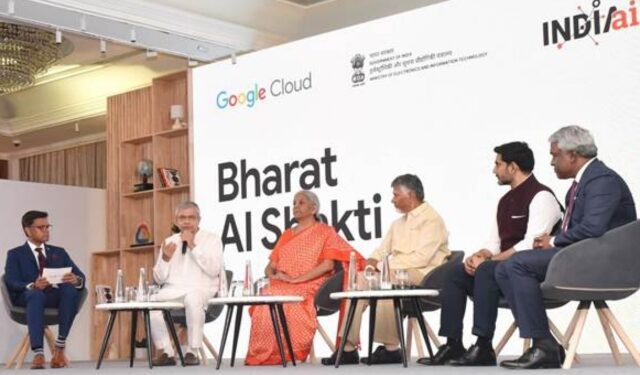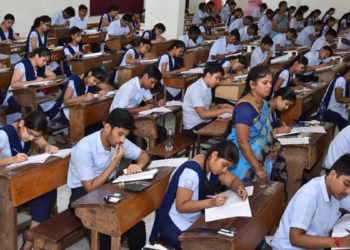In a landmark move set to redefine India’s digital landscape, Google has unveiled plans for a $15 billion Artificial Intelligence (AI) Hub in Visakhapatnam, Andhra Pradesh—the company’s largest investment in the country to date.
Announced at the Bharat AI Shakti event ahead of the India AI Summit, the initiative promises to supercharge AI-driven services. It aims to bolster clean energy infrastructure and spawn thousands of high-value jobs. This all aligns seamlessly with the government’s Viksit Bharat Vision.
Ashwini Vaishnaw’s Vision: Andaman as Global Data Hub, Vizag as AI Powerhouse
Union Minister for Electronics and Information Technology, Ashwini Vaishnaw, hailed the project as a “transformative step” for India’s burgeoning digital economy. Speaking at the event, he emphasised its role in pioneering “AI-first data centre architecture,” powered by new subsea cable networks and sustainable energy sources. “The Google AI Hub ushers in a new era for India’s digital economy,” Vaishnaw said. “It will not only fuel a new era of AI-driven services but also create high-value jobs and economic opportunities across the country. This digital infrastructure will go a long way in meeting the goals of our India AI Mission.”
✅ Andaman & Nicobar Islands have the potential to emerge as a hub for global internet data transfer: linking Southeast Asia, Australia & beyond.
✅ Vizag-Sittwe link will enhance digital connectivity to the Northeast. pic.twitter.com/51TVECt18B— Ashwini Vaishnaw (@AshwiniVaishnaw) October 14, 2025
The hub, spanning five years from 2026 to 2030, will integrate a gigawatt-scale data centre campus, advanced AI infrastructure, renewable energy systems, and an expanded fibre-optic network. Developed in partnership with AdaniConnex and Airtel, it will leverage Google’s Tensor Processing Units (TPUs). These are intended to rival Nvidia’s GPUs, forming a cornerstone of the India AI Mission’s common compute infrastructure. Vaishnaw urged Google to prioritise reskilling IT professionals amid AI’s rapid evolution. This would position the facility as a talent magnet for innovation.
Bharat Goes Big on AI: Google’s Mega Investment Fuels Viksit Bharat Dream
Andhra Pradesh Chief Minister N. Chandrababu Naidu echoed the enthusiasm, calling it “a new chapter in India’s digital transformation journey.” He spotlighted the state’s commitment to fostering startups and businesses through this gigawatt-scale powerhouse. “We are proud to host India’s first truly gigawatt-scale data centre and Google’s first AI Hub in India,” Naidu stated. This underscored the project’s testament to collaborative innovation.
Thomas Kurian, CEO of Google Cloud, described the hub as a “landmark investment in India’s digital future.” He highlighted its potential to enable faster business innovation and inclusive growth. “By delivering industry-leading AI infrastructure at scale, we are enabling businesses to innovate faster,” Kurian said. “This partnership reflects our shared commitment with the Indian and U.S. governments. It aims to harness AI responsibly and drive transformative impact for society.”
Pioneering Connectivity: Subsea Gateway and Regional Links
A standout feature is the creation of a new international subsea gateway in Visakhapatnam. It has multiple high-capacity cables landing on India’s eastern coast. This will connect to Google’s vast 2-million-mile global network, establishing Vizag as a pivotal AI and connectivity nexus. The move addresses surging digital demands, enhances route diversity beyond Mumbai and Chennai landings, and promotes low-latency services for users worldwide.
Vaishnaw went further, proposing ambitious expansions to bridge India’s northeast with global networks. He advocated for a Vizag-Sittwe (Myanmar) digital link to amplify connectivity in the North-Eastern states. This builds on RailTel’s existing network. “Extending the cable via Myanmar to Mizoram would be a major step forward,” he noted. This points to the completed railway line to Sairang and ongoing extensions to the Myanmar border, as directed by Prime Minister Narendra Modi.
In a bold vision for island geopolitics, Vaishnaw pitched the Andaman and Nicobar Islands as the “next major hub for global internet data transfer.” Citing Singapore’s overburdened status, he pledged full government support: “The Andaman Islands can help Google and other internet-based organisations connect to Southeast Asia, Australia, and other regions seeking new data capacity.”
Empowering Businesses and Research
When fully operational, the AI Hub will empower a spectrum of enterprises—from giants like MakeMyTrip, Meesho, and TCS to nimble startups such as CoRover, Glance, Invideo AI, and Sarvam. It will accelerate R&D and draw on innovations from Google’s R&D centers in Bengaluru, Hyderabad, and Pune. The campus will integrate into Google’s global AI data center footprint across 12 countries. This will deliver resilient, high-performance solutions for AI-powered apps.
Sustainability remains core. Google, renowned for energy-efficient operations, will collaborate on new transmission lines, clean energy generation, and storage in Andhra Pradesh. This expands India’s clean energy mix, fortifying the electricity grid against rising demands.
As India races toward AI leadership, the Google AI Hub stands as a beacon of Indo-US tech synergy, promising not just bytes and bandwidth but a blueprint for equitable digital prosperity.
About Google:
Google’s mission is to organise the world’s information and make it universally accessible and useful. Through products like Search, Maps, Android, YouTube, Google Workspace, and Google Cloud, it touches billions daily. Google is a subsidiary of Alphabet Inc.
RELATED: GOOGLE TO BUILD $15 BN AI HUB IN VIZAG, SUNDAR PICHAI CALLS IT A “LANDMARK”






























